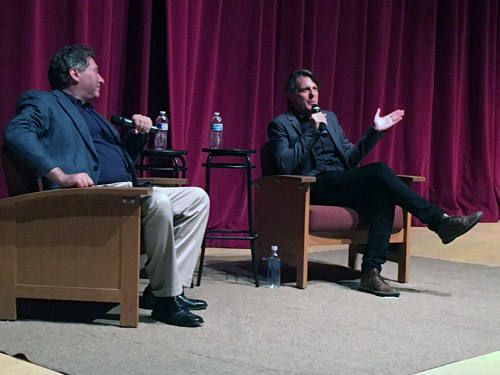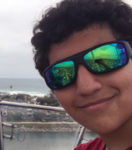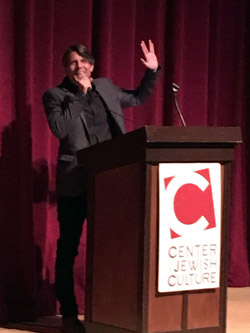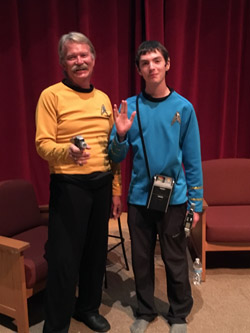
Story by Donald H. Harrison; Photos by Shor M. Masori


LA JOLLA, California – A special preview of the documentary For the Love of Spock at the Lawrence Family JCC proved to be a nostalgic occasion Wednesday evening, Sept. 21, both on screen and for members of the packed audience. The film’s producer Adam Nimoy divulged information both about his father, the actor Leonard Nimoy, and the half-human, half-Vulcan ever-logical character Spock that Leonard Nimoy famously portrayed in Star Trek.
Shown as a special preview for the San Diego Jewish Film Festival, which will begin next February, the documentary had some revealing moments, as when William Shattner, who played the lead role of Captain Kirk, admitted he had to come to grips with the fact that Nimoy as Spock was more popular with fans than he was, and console himself with the conclusion that Spock’s popularity meant that Star Trek would be a great success, benefiting all is cast and crew.
George Takei, who played the starship Enterprise’s senior helmsman Sulu, noted that after the regular Star Trek series was cancelled that there was a brief cartoon revival of the series on television. While Shattner and Nimoy were chosen to provide voice overs for their characters, Takei, at first, was not.
Nimoy told the producers of the animated series that Takei; Nichelle Nichols, who played the communications officer Lt. Uhura, and Walter Koenig, who played the navigator Pavel Chekov, and who were respectively Japanese, African, and Russian, represented one of the key components of Star Trek – the diversity of a globally unified bridge crew – and that unless Takei was selected, he would not participate in the series. Takei got the job, and in the documentary publicly expressed his appreciation to Nimoy.

The documentary covered some of the special things that Spock did which endeared him to science fiction fans including the split-fingered “live long and prosper” Vulcan greeting, which Nimoy borrowed from the Jewish hand gesture, describing the Hebrew letter shin, used by Kohanim to bless congregants. Other Spockisms included the Vulcan mind meld, and the shoulder nerve pinch by which Spock could render a combatant senseless; and his very large pointed ears and green blood.
But perhaps Spock’s most endearing features was his internal struggle between his logical Vulcan side and his emotional human side, a struggle with which Nimoy gave his character depth. The documentary also dwelled on the fact that the series’ creator Gene Roddenberry had put Spock, a half-alien outsider, in a position of respect and responsibility aboard the Enterprise, prompting a tremendous sense of empathy among fans who considered themselves, too, to be outsiders.
The documentary explored how the series inspired other actors (Jason Alexander does a wonderful imitation of Captain Kirk) and future scientists, including some who work today at headquarters of the National Aeronautics and Space Administration.

But this documentary is not just a hagiography; it also deals with Leonard Nimoy, the human, whom we learned suffered in his later years from alcoholism, and had a troubled relationship with his son, Adam, the producer of this documentary. During a question and answer period, a cosplaying member of the audience, who came dressed as Captain Kirk, asked Adam Nimoy to spell out what had soured his relationship with his father through much of their life, before their reconciliation.
Adam Nimoy said there was no point in going into detail, adding “Since we are at the Jewish Film Festival…. This (conflict between father and son) has been going on since Abraham, Isaac and Jacob.”
He described their reconciliation as the end product of a “12-step program for us …. We could hold onto our resentment and be right, or we could be happy.”
David Ellenstein, the artistic director of the North Coast Repertory Theater, served as moderator of the question-and-answer session following the film – a fortuitous choice because Ellenstein and Adam Nimoy were neighbors and friends since their boyhood, as were their parents. Ellenstein said he once mentioned to some neighborhood kids that “Mr. Spock” was coming to his house for dinner that night, and later “there were 18 bikes lined up outside my house.”
Ellenstein’s father, Robert, was a character actor who played in such TV series as “The Whistler;” “Robert Montgomery Presents;” “Gunsmoke;” “The United States Steel Hour;” “Perry Mason;” “The Wild Wild West;” and yes, “Start Trek.” In fact, in the movie Star Trek IV: The Voyage Home, Nimoy, serving as director, insisted that Robert Ellenstein be cast as the Federation President, Ellenstein’s son recalled.
During the Q&A, Adam Nimoy confirmed that in his father’s early years in Hollywood, he drove a cab and at a point when he was very discouraged about his acting career, he picked up John F. Kennedy, then a congressman from Massachusetts as a fare to the airport. Recognizing each other’s accents as belonging to fellow Bostonians, they chatted, and JFK encouraged Nimoy to stick to his craft. In acting as in politics, JFK told him, there always is room at the top for the good ones.
Years later, Adam and Leonard Nimoy were on a visit to Boston and decided to take a Boston Duck Tour – an amphibious ride through streets and water similar to San Diego’s Seal Tour. Leonard Nimoy, with dark glasses, sat in the back and listened as the conductor narrated a tour that took them past Kennedy’s old home. Then came the surprise: On the same tour, the conductor pointed out the neighborhood in which Leonard Nimoy had grown up. When the tour was over, Leonard thanked the conductor and revealed his identity, giving one conductor a surprise of his own.
Jackie Gmach, a former, long time coordinator of cultural activities for the Lawrence Family JCC, in her heavy French Tunisian accent, recited from the audience the story of the time she received a phone call from Nimoy who was interested in participating in what was then the JCC’s Barbra Streisand Festival of New Plays. She did not recognize his name – not even when he explained that he was the actor who had played Spock – and in frustration he hung up.
Gmach later learned what a faux pas she inadvertently had made, and sometime later, when Nimoy’s book of photographs Shechina, exploring the feminine, spiritual side of God, came out, she hastened to call him and invite him to appear at the San Diego Jewish Book Fair. He recognized her voice, identifying her as the lady who had never heard of him. Nevertheless, he accepted her invitation – a well-told story that prompted applause for Gmach.
David Ellenstein asked Adam Nimoy whether there was any material that he wished he could have gotten into the film, but had to leave out. The producer responded that he wished he could have given some attention to his father’s poetry. And he also wished that he had put in a clip from a “C Western” that his father had made with Yul Brynner.
*
Harrison is editor and Masori is a staff photographer of San Diego Jewish World. Their emails are donald.harrison@sdjewishworld.com and shor.masori@sdjewishworld.com, Comments intended for publication in the space below MUST be accompanied by the letter writer’s first and last name and by his/ her city and state of residence (city and country for those outside the United States.)